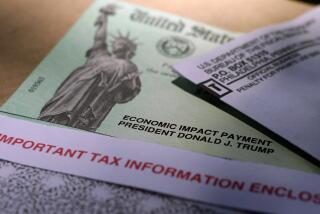How to Bounce Back From a Bad Check
- Share via
One of the most infuriating things you can receive in the mail is a check marked “Insufficient Funds.”
If the check was payable to you, it means you don’t have the money you thought you had, and if you deposited the check to your account to cover some of your expenses, some of your checks may soon turn into rubber too.
All too often the bounced check you received was for an insignificant amount, say $4.95, but the effort you exert to try to get the check made good is worth more like $100.
The state Legislature recognized that fact in 1983 when it enacted Section 1719 of the Civil Code, which allows you to collect $100 to $500 for a bad check. It was meant as a financial penalty for passing checks without enough money in the bank and a reward to those who pursued the bad-check writers.
It is especially helpful to merchants who frequently receive bad checks but can’t spare the time to go to small claims court to collect the amount owed, especially for only a few dollars. Now, you can collect enough to pay for the time it takes to go to court.
The way it works is relatively simple. Once a check bounces, you must make a written demand for payment in cash. The written demand must be mailed to the “maker” of the check (not the bank; the person who signed it) and must be sent by certified mail.
When it was first passed, the law said the letter must be “delivered” by certified mail, and sneaky check writers refused to sign for certified mail, so it wasn’t delivered. But the law has been changed to only require that the letter be mailed by certified mail, so your job is done when you leave the post office.
The check writer has 30 days to pay you in cash. You don’t have to accept another check; the law says you must be paid in good old American greenbacks. Of course, if I were you, I’d also take a certified check or some other sure-fire method of payment.
If payment isn’t made in a timely fashion, you can sue for the amount of the check plus an additional amount equal to three times the amount of the check, but not less than $100 or more than $500. So even if the check is only for $1, you will be awarded an additional $100, not just $3. On the other hand, if the check is for $250, you won’t be able to collect the full triple amount, because the law limits the maximum penalty to $500.
Small claims court, which is limited to handling disputes involving a maximum of $1,500, is a perfect forum to pursue your claim.
Perhaps even more infuriating than receiving a rubber check is learning that one of the checks you’ve written--especially if its the one you used to pay your rent--has been returned marked “Insufficient Funds,” when you had more than enough in the account to cover the check.
In general, if you can prove that the error was the bank’s fault and not yours, the bank may be liable for any losses caused by the bounced check.
The law holds a bank responsible for any of your losses that are the direct result of what lawyers call the “wrongful dishonor” of a check. If you can show that a check bounced as a result of the bank’s error--for instance, by showing with deposit slips that there was actually enough money that had cleared into the account to cover your check--then you may have a case against the bank.
You’ll also have to show that you were actually damaged and that the damage was a natural and foreseeable result of the bank’s error.
You can show damage in a variety of ways. Perhaps your credit rating was lowered or you lost a special discount because you failed to pay a bill on time. Of course, the damages may exceed the amount of the check. A bounced rent check could mean eviction proceedings; a bounced car payment could mean repossession of the car.
If you have significant damages, you should consult a lawyer. If the amount in dispute is not large, you may want to file in small claims court, but first you should try to resolve the dispute with the bank directly.
Legal Brief
Recently I mentioned a proposed new law that would require written fee agreements with lawyers whenever you expect to pay them more than $1,000 for legal services. Well, Gov. George Deukmejian signed the bill into law, so now not only do written agreements make good sense, they are also required by law.
Attorney Jeffrey S. Klein, The Times’ senior staff counsel, cannot answer mail personally but will respond in this column to questions of general interest about the law. Do not telephone. Write to Jeffrey S. Klein, Legal View, The Times, Times Mirror Square, Los Angeles 90053.

